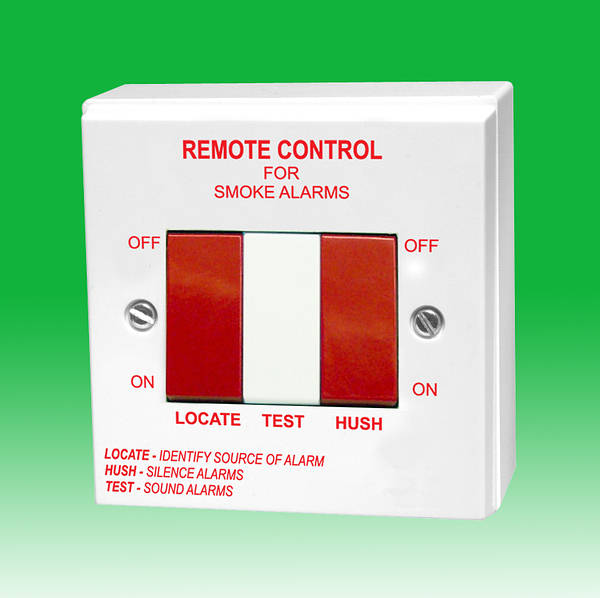We'd like to remind Forumites to please avoid political debate on the Forum... Read More »
📨 Have you signed up to the Forum's new Email Digest yet? Get a selection of trending threads sent straight to your inbox daily, weekly or monthly!
Smoke detector installation - signing off extension
Comments
-
Doozergirl wrote: »Pardon?
I appreciate that you consider yourself the forum pedant on the things that you know about.
I approach this from being a human being with 20 years of experience of entire building projects, (not an electrician) talking in clear English to someone who is back where I was 20 years ago. I can appreciate that. I don't even understand what you've just written, so I'm not sire how the OP is supposed to.
I'm not misleading a person who wants to whack up £20 battery powered alarms by giving a clear and simple message to them that their alarms need be hard-wired, rather than battery powered and screwed to a ceiling. Their builder has already pointed out the need to conform.
I've just googled your market-leading smoke alarms. The Nest does exactly what you say it doesn't, is user-friendly to the point of looking after itself and messaging you if it's broken, even(!), and does far more besides. I have never been more impressed by one product introduced to the building trade. I haven't listed them all, in this thread, but it is a revolution in comparison to the average smoke alarm.
"Market-leading" doesn't mean *best* when it comes to feeling and being safe, I would love to see something that does even more than the Nest does. It's a large cost compared to the cheapest stuff, but it's literally life saving.
Please feel free to show me how the product you use provides the same level of reassurance as the Nest and I'll save my clients some money.
It would seem that you don't know the difference between smoke and heat detectors. Here, Category LD2 systems are the minimum so not making heat detectors would prevent compliant installations being commissioned.
The minimum for a domestic installation here is a Grade D, Category LD2 system to BS 5839-6. (Across the border is similar, although I.S. 3218 applies there.)
I'm not sure why you felt the need to get high and mighty when you openly admit that it's an area you know little about.0 -
I know what a heat detector is, I know what a CO monitor is, I know what a smoke alarm is and I also know where each is required. I don't operate on grades, categories or the precise BSs because I employ people relevantly qualified, but I do know that the Nest performs each of those tasks in every location, surpassing regulations and bypassing the inconvenience that is the average smoke detector.
Not only do they detect everything, they will warn you before sounding, they are zoned when installed so they will both speak and message you to tell you exactly which room the issue is in; they test themselves daily at bedtime without requiring human input and sound the alarm once a month, I believe; if one is faulty, it will message and ask you to replace it; they detect motion and will provide a night light if you get up; they require zero maintenance or thought and are totally proactive.
BCOs are visibly impressed by them. They go above and beyond the minimum standards set by the regs.
As I said, happy to hear how fabulous and reassuring these market leaders are, so that I can change my recommendation and save my clients money.Everything that is supposed to be in heaven is already here on earth.
0 -
As both an Aico Expert Installer and a Nest Pro I was informed that Nest do not produce a heat detector and that they have no plans to produce one either. They were able to get away with this in England due to the cop-out over there of allowing Category LD3 systems instead of the LD2 systems mandated here.Doozergirl wrote: »I do know that the Nest performs each of those tasks in every location
So unless this has changed extremely recently with their product then your information is flawed.
I would always recommend Aico (Ei Electronics) for domestic fire and carbon monoxide detection systems. They aren't the cheapest, but they are the best. Almost all electrical contractors recommend Aico/Ei Electronics, so that should tell you something. And I can assure you that it isn't based on cost - they are probably the most expensive brand.
All of their units are made in Ireland, in their factory in Shannon, Co. Clare.0 -
You were provided with a link several threads ago to Nest's own website.
They do not produce a stand alone heat sensor. They don't need to.
The requirement for a separate heat sensor comes from people setting off smoke alarms when they're cooking. People are prone to removing smoke alarms when they are annoying, so the logic is to have something less sensitive, taking away a sensor.
It's 2019. There are better ways of doing things now. If one does burn the dinner, there isn't a mad alarm in the first instance and you just press a button on an app instead of flailing around with a tea towel every day until you smash it off the ceiling. Nest aren't 'getting away' with anything by having more features.
The fire in my kitchen was picked up by the smoke alarm in the Nest well before any heat sensor, so I'm not sure how only having a heat sensor is superior in any way.
It would benefit the OP to know what the best alarms are and why - in plain English - if there is something better and cheaper.
As it stands, I genuinely safer than I ever have when it comes to fire detection. When we move to our new house, all the alarms will be Nest ones and I will feel completely confident of knowing that my alarms are all working and that I will be told what the issue is, and where, very quickly. We will go above the minimum requirements laid out by the regulations too - there's nothing stopping any of us doing that.Everything that is supposed to be in heaven is already here on earth.
0 -
Doozergirl wrote: »The requirement for a separate heat sensor comes from people setting off smoke alarms when they're cooking. People are prone to removing smoke alarms when they are annoying, so the logic is to have something less sensitive, taking away a sensor.
It's 2019. There are better ways of doing things now.
If OP is building an extension, they would need to get appropriate sign off from the council.0 -
We had problems with a fitted and interlinked electric smoke alarms, where one had gone faulty.
The smoke alarm company, no longer made the exact same model. However, when they introduced a new model, changed the fittings too. So I could not remove the faulty one and replace with a new one.
I needed an electrician to replace the back panel onto which the smoke alarm attached to.
If the smoke alarm company kept the same fittings, I could have just removed the old smoke alarm and replaced it with the new one.
So be weary, of choosing the right company, whether they will guarantee the fittings and compatibility with older models.0 -
Doozergirl wrote: »If one does burn the dinner, there isn't a mad alarm in the first instance and you just press a button on an app
If an alarm goes off the last thing I want to be doing is faffing around with an app. I also wouldn't trust apps to be supported on different operating systems and platforms in several years' time.
I just press my Aico locator switch and it silences all but the triggered alarm.
I can then press the hush button to mute it.Doozergirl wrote: »The fire in my kitchen was picked up by the smoke alarm in the Nest well before any heat sensor, so I'm not sure how only having a heat sensor is superior in any way.
I'm not either. Unless you have a closed fire door to your kitchen, a smoke detector in the hall is likely to detect the fire much earlier than a heat detector. However a heat detector in the kitchen is now required under Building Standards in Scotland, and presumably similar in England.
One big advantage of things like Nest is if you're away from home.A kind word lasts a minute, a skelped erse is sair for a day.0 -
I'm a fan of my Nest Protect but it's worth pointing out that due to the lifespan of the sensors, it would need to be replaced after 7 years (for first gen devices) or 10 years (for second gen devices). That would be quite costly if you've fitted out your whole house with them.0
-
TheCyclingProgrammer wrote: »I'm a fan of my Nest Protect but it's worth pointing out that due to the lifespan of the sensors, it would need to be replaced after 7 years (for first gen devices) or 10 years (for second gen devices). That would be quite costly if you've fitted out your whole house with them.
Don't all smoke detectors have to be replaced about every 10 years?Tall, dark & handsome. Well two out of three ain't bad.0
This discussion has been closed.
Confirm your email address to Create Threads and Reply

Categories
- All Categories
- 351.5K Banking & Borrowing
- 253.3K Reduce Debt & Boost Income
- 453.9K Spending & Discounts
- 244.5K Work, Benefits & Business
- 599.8K Mortgages, Homes & Bills
- 177.2K Life & Family
- 258K Travel & Transport
- 1.5M Hobbies & Leisure
- 16.2K Discuss & Feedback
- 37.6K Read-Only Boards






